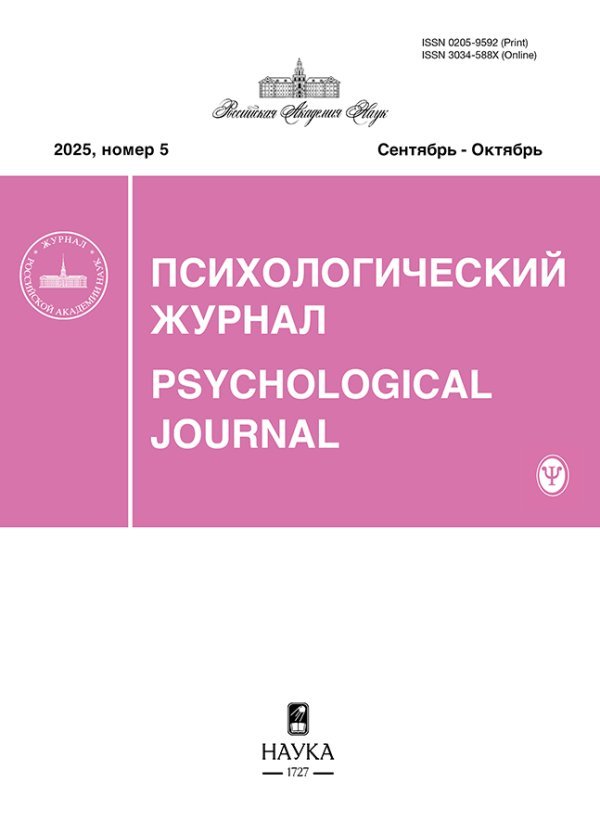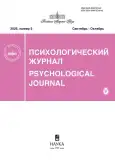The Role of Empathy and Emotional Intelligence in the Regulation of Moral Choice
- Authors: Denisova A.I.1,2, Kornilova T.V.2
-
Affiliations:
- Psychiatric Clinical Hospital № 4 named after P.B. Gannushkin DZM
- Lomonosov Moscow State University
- Issue: Vol 46, No 5 (2025)
- Pages: 43-53
- Section: Psychology of personality
- URL: https://stomuniver.ru/0205-9592/article/view/696882
- DOI: https://doi.org/10.31857/S0205959225050057
- ID: 696882
Cite item
Abstract
The article is devoted to studying the role of emotional components in regulating decision-making based on verbal tasks that model the conditions of moral choice. The following research objectives were set: 1) identification of the relationships between empathy and emotional intelligence and levels of moral development; 2) determination of the role of appealing to the emotional component through the characteristics of the character in the situation (“good – evil”) on choice preferences in moral dilemmas. Hypotheses were proposed about the positive relationship between empathy and emotional intelligence (EI) indicators with the transition to the stage of autonomous morality, as well as about the influence of a given character characteristic on the preference for alternatives corresponding to the stages of autonomous morality. The study involved 202 university students (37 men, 165 women) aged 18–35 (Med = 21.5, SD = 5.6). Psychodiagnostic methods were used: the Cognitive and Affective Empathy Questionnaire, the EmInt (Emotional Intelligence) test, and the Fairness–Care Questionnaire. 102 people from the sample (12 men, 90 women, Med = 20.8, SD = 3.8) took part in the verbal tasks. Six tasks were developed as moral dilemmas and involved choosing from alternatives corresponding to different stages of moral development; in two series, they differed in the character factor – “good and evil”. It was found that the indication of an “evil” character statistically significantly increased the frequency of choosing alternatives corresponding to the preconventional stage of moral development (hedonistic orientation or punishment/reward orientation). In tasks with a “good” character, the preference for choice corresponded to higher stages of autonomous morality. Significant differences in the choice of alternatives depending on the characteristics of the characters in moral dilemmas and a positive relationship between behavior choice and empathy and emotional intelligence were established.
About the authors
A. I. Denisova
Psychiatric Clinical Hospital № 4 named after P.B. Gannushkin DZM; Lomonosov Moscow State University
Author for correspondence.
Email: alina_belousova@inbox.ru
107076, Moscow, Poteshnaya str., 3, Russia.; 125009, Moscow, Mokhovaya st. 11/9, Russia.
T. V. Kornilova
Lomonosov Moscow State University
Email: tvkornilova@mail.ru
125009, Moscow, Mokhovaya st. 11/9, Russia.
References
- Abul’hanova K.A. Social’nye predstavleniya lichnostiю Sovremennaya psihologiya: sostoyanie i perspektivy issledovaniya. Ch. 3. Social’nye predstavleniya i myshlenie lichnosti. Moscow: Izd-vo “Institut psihologii RAN”, 2002. P. 92–93. (In Russian)
- Ancyferova L.I. Svyaz’ moral’nogo soznaniya s nravstvennym povedeniem cheloveka (po materialam issledovaniĭ Lourensa Kolberga i ego shkoly). Psikhologicheskii zhurnal. 1999. V. 20. № 3. P. 5–17. (In Russian)
- Belousova A.I., Gejvandova M.Ya. Kognitivnaya i affektivnaya empatiya: aprobaciya oprosnika na rossijskoj vyborke). Vestnik Moskovskogo gosudarstvennogo oblastnogo universiteta. Seriya: Psihologicheskie nauki. 2021. V. 31 (2). P. 6–20. (In Russian)
- Belousova A.I., Zhou C. Empatiya v predpochtenii racional’nogo i emocional’nogo vybora (sravnenie kitajskoj i rossijskoj vyborok). Vestnik Moskovskogo gosudarstvennogo oblastnogo universiteta Seriya: Psihologicheskie nauki. 2023. № 1. P. 43–58. (In Russian)
- Budinaĭte G.L., Kornilova T.V. Lichnostnye cennosti i lichnostnye predpochteniya sub’ekta. Voprosy psihologii, 1993. № 5. P. 99–105. (In Russian)
- Kaneman D. Dumaj medlenno… reshaj bystro. Moscow: AST, 2014. 656 p. (In Russian)
- Kornilova T.V. Intellektual’no-lichnostnyj potencial cheloveka v usloviyah neopredelennosti i riska. Saint Petersburg: Nestor-Istoriya, 2016. 344 p. (In Russian)
- Kornilova T.V. Cherty emocional’nogo intellekta (po TEIQue) kak prediktory stilevoj regulyacii prinyatiya reshenij. Psikhologicheskii zhurnal. 2023. V. 44. № 4. P. 82–92. (In Russian)
- Kornilova T.V. Empatiya v strukturah intellektual’no-lichnostnogo potenciala: edinstvo intellekta i affekta. Psikhologicheskii zhurnal. 2022. V. 43. № 3. P. 57–68. (In Russian)
- Kornilova T.V., Zirenko M.S., Zhou C. Kross-kul’turnoe sravnenie lichnostnoj regulyacii prinyatiya reshenij o social’nom distancirovanii (Rossiya, Azerbajdzhan, Kitaj). Psihologicheskoe soprovozhdenie pandemii COVID-19. Ed. Yu.P. Zinchenko. Moscow: Izd-vo Moskovskogo universiteta, 2021. P. 402–426. (In Russian)
- Lyusin D.V. Oprosnik na emocional’nyj intellekt EmIn: novye psihometricheskie dannye. Social’nyj i emocional’nyj intellect. Eds. D.V. Lyusin, D.V. Ushakov. Moscow: Izd-vo “Institut psihologii RAN”, 2009. P. 264–278. (In Russian)
- Molchanov S.V. Moral’no-cennostnye orientacii kak funkciya social’noj situacii razvitiya. Kul’turno-istoricheskaya psihologiya. 2007. V. 3. № 1. P. 73–79. (In Russian)
- Plyaskina A.S., Podd’yakov A.N. Rol’ emocional’nogo intellekta vo vzaimodejstvii myshleniya i emocij lichnosti pri reshenii moral’nyh dilemm: postanovka problem. Fundamental’nye i prikladnye issledovaniya sovremennoj psihologii. Rezul’taty i perspektivy razvitiya. Moscow: Izd-vo “Institut psihologii RAN”, 2017. P. 1237–1242. (In Russian)
- Hauzer M.D. Moral’ i razum: kak priroda sozdavala nashe universal’noe chuvstvo dobra i zla. Moscow: Drofa, 2008. 639 p. (In Russian)
- ColbyA., Kohlberg L. The measurement of moral judgment: V. 1. Theoretical foundations and research validation. Cambridge, England: Cambridge University Press, 1987. 408 p.
- Decety J., Cowell J. Friends or Foes: Is Empathy Necessary for Moral Behavior? Perspectives on Psychological Science. 2014. V. 9(5). P. 525–537.
- Gigerenzer G. Rationality for mortals: How people cope with uncertainty. New York: Oxford University Press, 2008. P. 203–229.
- Gilligan C. In a different voice: Woman’s conception of self and morality. Harvard Educational Review. 1982. V. 47. P. 481–517.
- Kohlberg L. The Philosophy of Moral Development Moral Stages and the Idea of Justice. Harper & Row, 1981. 441 p.
- Kornilova T.V., Chigrinova I.A. Personal values, moral development, and emotional intelligence in the regulation of choice in situations that involve interpersonal interactions. Psychology. Journal of Higher School of Economics. 2014. V. 11 (4). P. 65–89.
- Mayer J.D., Salovey Р., Caruso D.R. The ability model of emotional intelligence: Principles and updates. Emotional Revier. 2016. V. 8 (4). P. 290–300.
- McDonald B., Kanske Ph. Gender differences in empathy, compassion, and prosocial donations, but not theory of mind in a naturalistic social task. Scientific Reports. 2023. V. 13 (1). doi: 10.1038/s41598-023-47747-9.
- Reniers R. L., Corcoran R., Drake R., Shryane N.M. & Völlm B.A. The QCAE: A questionnaire of cognitive and affective empathy. Journal of Personality Assessment. 2011. V. 93 (1). P. 84–95.
Supplementary files










